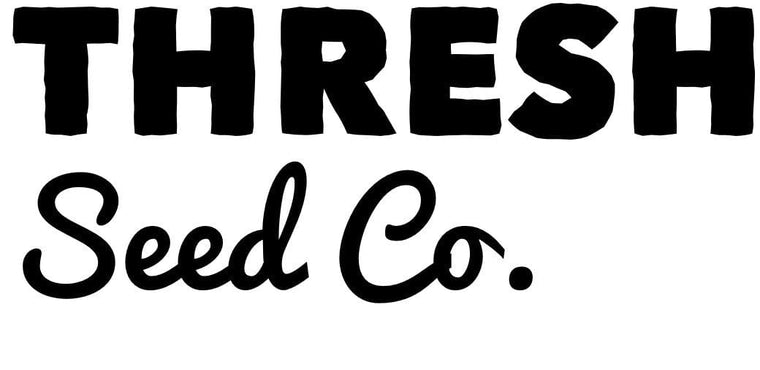Welcome to our blog. If you’ve read the About Us page on our website, you already have the gist of our story. We began gardening around fifteen years ago, guided by some wise and generous neighbors who taught us the basic skills we needed to get our start in gardening. In the following years, we expanded our garden space and seed collection until finally we decided to start our own heirloom seed business, Thresh Seed Co. Along the way, we’ve had many gardening successes, but also many failures and those experiences have shaped our thoughts on how to grow a bountiful and nutrient-rich garden. In the proceeding posts, I hope to share with you the lessons we’ve learned in our first decade of gardening, with many more yet to be learned in the coming years. Before we begin, though, I would like to share a little more about ourselves. The info in here is not intended to serve as our bona fides as garden experts, because we’re not. Growing a nice garden doesn’t require a degree or a fancy title, just a love for growing things and a desire to make next year’s garden even better than this one.
Dave Weeks
Farmer, fabricator, beekeeper

Although he normally works quietly in the background of the business, I figured I would introduce Dave first because without him, Thresh Seed Co. wouldn't exist. He is the resident farmer, beekeeper, mechanic, metal fabricator, carpenter, and process engineer. Dave is also a Cub Cadet enthusiast and has a collection of Cub Cadets, each of which serves its own purpose in the garden, or so he tells me. Someday, I hope I can persuade him to write an article about the custom tractor he built for me when we were first getting serious about gardening. Dubbed the "RB" (for Raised Bed), it is used for making raised garden beds and later in the season for cultivating. As the business has grown and I've had to take more time away to care for our children, Dave has also stepped in with a lot of the day-to-day operations of the business. In fact, if you call to place an order, chances are you will speak to Dave.
Becky Weeks, Ph.D.
Geneticist, gardener, crazy canner

I’ve always wished that I had one of those Mayberry stories about gardening—that I had spent my summers next to Grandma at the kitchen sink, peeling tomatoes and filling quarts of pickled cucumbers and beets—but the truth is that I didn't really take a serious interest in gardening until I was grown. My decision to finally try growing vegetables was borne out of three motivations; the desire to eat healthier, a need to stretch our grocery budget, and a growing interest in genetics and plant breeding. Since then, I have learned a lot about gardening and, in parallel, a lot about plant genetics, but the knowledge I value most is that which I have learned from more experienced gardeners. My interests are all centered around one goal: growing the most nutrient-dense food possible and lots of it. Consequently, I've developed the reputation of being a sometimes overzealous home canner and I will admit to occasionally coaxing family and friends to bail me out in marathon canning sessions I like to call "extravacanzas" which perhaps are not as fun as they sound, but are at the very least gratifying. Join me as I chart our way through another decade (hopefully more) of gardening and canning adventures.
Our Little Helpers
Boo Boo, Bird Dog & Baby J.

Across our website, you'll see photos of our kids gardening, holding produce, and generally just being kids. While our lives are often loud, messy, and far too busy, we are continually striving to live a "quiet and peaceable life." Our kids spend much of their free time playing in puddles, pretend farming in the dirt, and searching for animal bones that they can drag into the house. It's not a particularly tidy existence, but they seem like they're having fun.
"...aspire to live quietly, and to mind your own affairs, and to work with your hands, as we instructed you, so that you may walk properly before outsiders and be dependent on no one." 1 Thessalonians 4:11–12
Say Hello to Our Little Friends
We can't take credit for all the work that gets done on the farm. In fact, as hard as we would like to think that we work, our two, four, and six-legged friends are the ones really pulling the heavy weight. Here are a few of our favorite furry, fuzzy, and feathery farmhands.
The Hogs
Boss, Mama, Apples & the little ones

Our herd of heritage Large Black Hogs are charged with the daily task of working our pastures and woodlands. There they search out and destroy grubs and invasive plants like thistle and they help regenerate natural pasture species. In the fall, they clean up all of our discarded produce and their winter manure supplies us with all of the compost we could ever need for our trial and production gardens.
The Royal Family
Queenie and the Sugar Mamas

Perhaps the most important helpers on our farm are our honeybees. Without bees, both honeybees and native species, we certainly wouldn't be able to produce seeds. Our honeybees pollinate our crops and help maintain the diverse population of natural wildflowers that inhabit our area. If conditions permit, they will also produce an extra honey harvest for us in the fall.
Join Us as We Grow and Learn
Come along with me as we experiment with new growing techniques, varieties, and recipes. Let's share our experiences, successes and failures, and use them in our continual pursuit of that dream garden. Be sure to comment, share your tips, and let us know what you've found helpful. We're excited to learn.






Becky
June 18, 2023
Thank you so much, Katy! We’re so glad you found us!